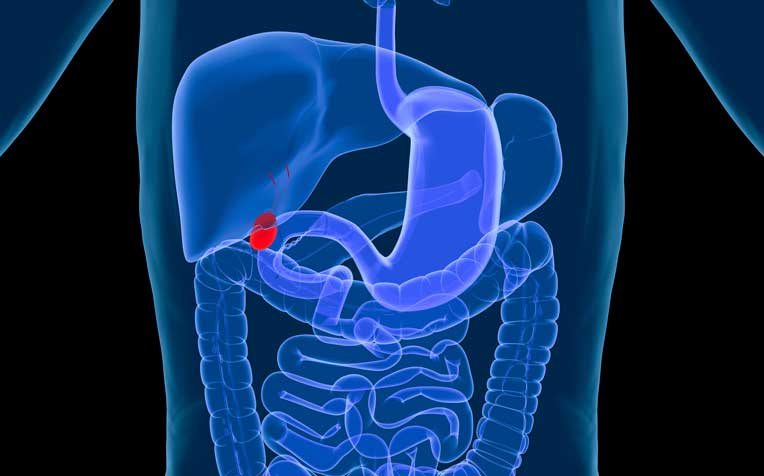
Gallbladder disease is caused by gallstones, which are formed by an imbalance in bile acid components.
Gallbladder disease is caused by the formation of gallstones in the gallbladder.
In a normal person, bile acids and proteins prevent the formation of stones.
But when there’s an imbalance in the bile components, pebble-like deposits known as gallstones are formed in the gallbladder.
“There are three main types of gallstones – cholesterol stones, pigment stones, and mixed stones,” says Dr Kam Juinn Huar, Head & Senior Consultant, Hepato-pancreato-biliary (HPB) Service, Sengkang General Hospital (SKH), a member of the SingHealth group.
“Cholesterol stones are formed when bile contains too much cholesterol or bilirubin, when there are not enough bile salts, or when the gallbladder does not empty completely,” explains Dr Kam. “Meanwhile, pigment stones tend to develop in patients with liver cirrhosis, biliary tract infections, or hereditary blood disorders like haemolytic anaemia.
“Cholesterol stones were more commonly seen in western world. However, due to the change in lifestyle and dietary habits, we have seen more and more cholesterol or mixed stones in our part of the world,” added Dr Kam.
Who should watch out for gallstones?
While it is not known why such imbalances in the bile components occur, some people are more at risk for gallbladder disease than others because of a variety of factors:
-
Gender:
“Women are twice as likely as men to develop gallstones,” says Dr Kam. “That’s because excess oestrogen after pregnancy, hormone replacement therapy and oral contraceptive pills tend to increase cholesterol levels in bile.”
-
Genetics:
Gallstones tend to run in families, suggesting a genetic link. “If your parents, siblings or relatives had gallbladder disease, it is more likely that you will suffer from it too,” says Dr Kam.
-
Being overweight or obese:
Obesity is a major risk factor for gallstones. Dr Lee explains: “That’s probably because of the interplay of several factors – high-fat diet, diabetes, sedentary lifestyle, and other concomitant medical conditions.”
-
Age:
Patients over 50 years of age tend to develop gallstones compared to younger patients.
-
High-fat diet:
A diet high in cholesterol and fat but low in fibre increases the risk of gallstone formation.
-
Diabetes:
Diabetic patients have higher fatty acids, which increases their risk of gallstones. “In addition, diabetic patients also tend to experience worse infections,” says Dr Kam.
-
Cholesterol-lowering drugs (“statins”):
Patients on such drugs are more at risk. Dr Kam says: “While these drugs lower blood cholesterol, they increase the amount of cholesterol secreted into the bile, hence increasing gallstone formation.”
There are other risk factors too. Dr Kam explains: “Patients who have cirrhosis, Crohn’s Disease, or certain blood disorders; or those who are on prolonged intravenous feeding or certain medications might also be at a higher risk for gallbladder disease.”
How to prevent gallbladder disease
If you happen to fall into any of the high-risk groups for gallbladder disease, you can lower your risk by modifying your lifestyle.
- Adopt a low-fat, high-fibre diet: Fats, especially saturated fats found in meats, butter and other animal products, are associated with gallstone attacks. “Pick monounsaturated fats (like olive oil) or omega-3 fatty acids (found in fish or flaxseed oil) instead,” advises Dr Kam. “Also eat plenty of fruits and vegetables.”
- Some alcohol might be okay: Certain studies have found that moderate alcohol consumption reduces the risk of gallstones, but heavy drinking may do the reverse. Dr Kam adds: “Even though moderate amount of alcohol helps reduce the risk of gallstones formation, pregnant women and those with liver disease should avoid alcohol.”
- Have a cuppa: Some studies have found that a cup of coffee a day can lower the risk of gallstones. “The caffeine in coffee can stimulate gallbladder contractions and lower the cholesterol concentrations in bile,” says Dr Kam.
- Maintain an ideal weight
Dr Kam advises: “If you manage your risks properly, you can significantly lower your risk of gallbladder disease.”
Ref: G25 (ed)
Related articles:
Gallbladder Disease: Stages and Symptoms












.png)





 Get it on Google Play
Get it on Google Play